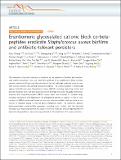| dc.contributor.author | Hammond, Paula T. | |
| dc.contributor.author | Bazan, Guillermo C. | |
| dc.date.accessioned | 2020-04-13T12:36:46Z | |
| dc.date.available | 2020-04-13T12:36:46Z | |
| dc.date.issued | 2019-10-21 | |
| dc.identifier.issn | 2041-1723 | |
| dc.identifier.uri | https://hdl.handle.net/1721.1/124558 | |
| dc.description.abstract | The treatment of bacterial infections is hindered by the presence of biofilms and metabolically inactive persisters. Here, we report the synthesis of an enantiomeric block co-beta-peptide, poly(amido-D-glucose)-block-poly(beta-L-lysine), with high yield and purity by one-shot one-pot anionic-ring opening (co)polymerization. The co-beta-peptide is bactericidal against methicillin-resistant Staphylococcus aureus (MRSA), including replicating, biofilm and persister bacterial cells, and also disperses biofilm biomass. It is active towards community-acquired and hospital-associated MRSA strains which are resistant to multiple drugs including vancomycin and daptomycin. Its antibacterial activity is superior to that of vancomycin in MRSA mouse and human ex vivo skin infection models, with no acute in vivo toxicity in repeated dosing in mice at above therapeutic levels. The copolymer displays bacteria-activated surfactant-like properties, resulting from contact with the bacterial envelope. Our results indicate that this class of non-toxic molecule, effective against different bacterial sub-populations, has promising potential for the treatment of S. aureus infections. | en_US |
| dc.description.sponsorship | Singapore. Ministry of Education. Academic Research Fund (AcRF) Tier 3 (Grant MOE2013-T3-1-004) | en_US |
| dc.description.sponsorship | Singapore. Ministry of Education. Industry Alignment Fund (NMRC/MOHIAFCAT2/003/2014) | en_US |
| dc.language.iso | en | |
| dc.publisher | Springer Science and Business Media LLC | en_US |
| dc.relation.isversionof | 10.1038/s41467-019-12702-8 | en_US |
| dc.rights | Creative Commons Attribution 4.0 International license | en_US |
| dc.rights.uri | https://creativecommons.org/licenses/by/4.0/ | en_US |
| dc.source | Nature | en_US |
| dc.subject | General Biochemistry, Genetics and Molecular Biology | en_US |
| dc.subject | General Physics and Astronomy | en_US |
| dc.subject | General Chemistry | en_US |
| dc.title | Enantiomeric glycosylated cationic block co-beta-peptides eradicate Staphylococcus aureus biofilms and antibiotic-tolerant persisters | en_US |
| dc.type | Article | en_US |
| dc.identifier.citation | Zhang, Kaixi et al. "Enantiomeric glycosylated cationic block co-beta-peptides eradicate Staphylococcus aureus biofilms and antibiotic-tolerant persisters." Nature communicatins 10 (2019): 1038 © 2019 The Author(s) | en_US |
| dc.contributor.department | Singapore-MIT Alliance in Research and Technology (SMART) | |
| dc.contributor.department | Koch Institute for Integrative Cancer Research at MIT | |
| dc.contributor.department | Massachusetts Institute of Technology. Department of Chemical Engineering | |
| dc.relation.journal | Nature communicatins | en_US |
| dc.eprint.version | Final published version | en_US |
| dc.type.uri | http://purl.org/eprint/type/JournalArticle | en_US |
| eprint.status | http://purl.org/eprint/status/PeerReviewed | en_US |
| dc.date.updated | 2020-02-06T13:56:33Z | |
| dspace.date.submission | 2020-02-06T13:56:36Z | |
| mit.journal.volume | 10 | en_US |
| mit.journal.issue | 1 | en_US |
| mit.license | PUBLISHER_CC | |
| mit.metadata.status | Complete | |
